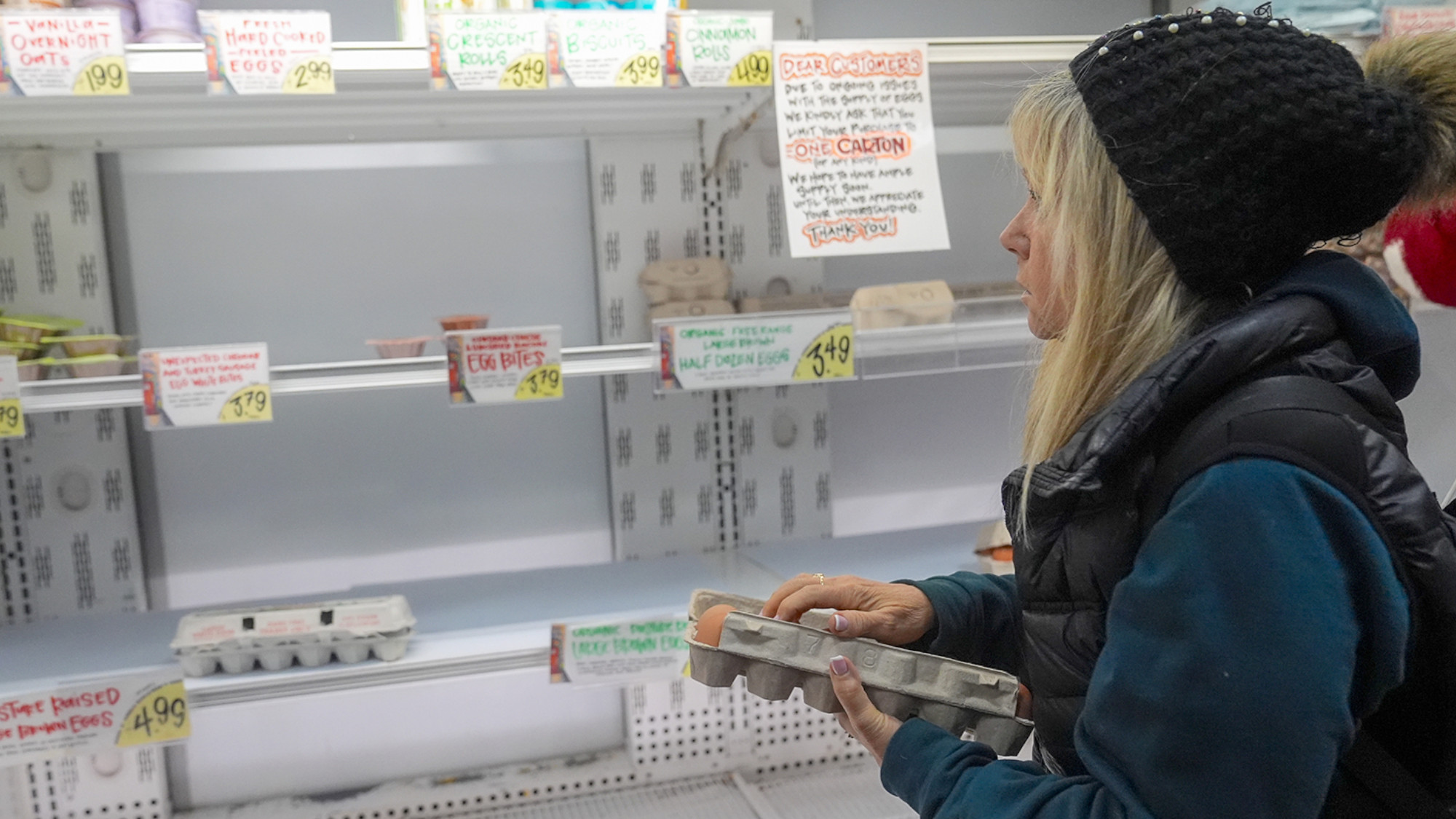Bird flu: The viral threat pushing up egg prices

A free daily email with the biggest news stories of the day – and the best features from TheWeek.com
You are now subscribed
Your newsletter sign-up was successful
"Easter isn't until April, but the hunt is on for eggs," said Caroline Petrow-Cohen in the Los Angeles Times. "The breakfast staple has become pricier and harder to find" as the bird flu outbreak has worsened; in December alone, some 13 million chickens died of the disease or were culled to contain it. The average price of a dozen eggs nearly doubled over the past year to a record $4.95, and some grocery stores are now limiting how many boxes customers can buy. But "there's a lot more at stake than the price of eggs," said F.D. Flam in Bloomberg. At least 69 people in the U.S. have contracted avian flu, and one person—a Louisiana resident with a backyard flock of chickens—has died of the H5N1 virus. So far, the spread has only been from animal to person, with most human cases occurring in farm workers who had close contact with infected birds or dairy cows. But each new infection increases the odds that the virus will mutate to allow human-to-human transmission and "spark the next pandemic."
Despite that threat, the White House is "hobbling public health officials' response" to the outbreak, said Shannon Pettypiece in NBC News. The Trump administration has fired about a quarter of the personnel at an Agriculture Department program that tracks the spread of bird flu, and has laid off some 1,200 employees at the National Institutes of Health—including many promising young disease detectives. President Trump even briefly froze almost all external communication from the Centers for Disease Control; the agency is still not issuing regular bird flu updates. "We just don't know what's happening," said Michael Kilkenny, head of the Huntington Health Department in West Virginia. "We don't know if [bird flu] is expanding into our area if we aren't getting that communication from the CDC."
Bird flu will be the "first real test" for Robert F. Kennedy Jr., said Carolyn C. Cannuscio and Rachel Feuerstein-Simon in The Philadelphia Inquirer. If the outbreak becomes a pandemic, "our best defense would be a new vaccine"—and as the newly confirmed health and human services secretary, Kennedy will have to support its development, testing, and approval; oversee its distribution; and build public trust in the lifesaving shot. "This is a tall order for a person who has built a reputation, career, and wealth" on anti-vaccine activism, and who recently said he wanted to pause infectious disease research for eight years. But Kennedy "is the secretary of HHS we have," so "let's hope he meets the moment." His performance could be "a matter of life and death."
The Week
Escape your echo chamber. Get the facts behind the news, plus analysis from multiple perspectives.

Sign up for The Week's Free Newsletters
From our morning news briefing to a weekly Good News Newsletter, get the best of The Week delivered directly to your inbox.
From our morning news briefing to a weekly Good News Newsletter, get the best of The Week delivered directly to your inbox.
A free daily email with the biggest news stories of the day – and the best features from TheWeek.com
-
 Tourangelle-style pork with prunes recipe
Tourangelle-style pork with prunes recipeThe Week Recommends This traditional, rustic dish is a French classic
-
 The Epstein files: glimpses of a deeply disturbing world
The Epstein files: glimpses of a deeply disturbing worldIn the Spotlight Trove of released documents paint a picture of depravity and privilege in which men hold the cards, and women are powerless or peripheral
-
 Jeff Bezos: cutting the legs off The Washington Post
Jeff Bezos: cutting the legs off The Washington PostIn the Spotlight A stalwart of American journalism is a shadow of itself after swingeing cuts by its billionaire owner
-
 Scientists are worried about amoebas
Scientists are worried about amoebasUnder the radar Small and very mighty
-
 Growing a brain in the lab
Growing a brain in the labFeature It's a tiny version of a developing human cerebral cortex
-
 A Nipah virus outbreak in India has brought back Covid-era surveillance
A Nipah virus outbreak in India has brought back Covid-era surveillanceUnder the radar The disease can spread through animals and humans
-
 Deaths of children under 5 have gone up for the first time this century
Deaths of children under 5 have gone up for the first time this centuryUnder the radar Poor funding is the culprit
-
 A fentanyl vaccine may be on the horizon
A fentanyl vaccine may be on the horizonUnder the radar Taking a serious jab at the opioid epidemic
-
 Health: Will Kennedy dismantle U.S. immunization policy?
Health: Will Kennedy dismantle U.S. immunization policy?Feature ‘America’s vaccine playbook is being rewritten by people who don’t believe in them’
-
 Obesity drugs: Will Trump’s plan lower costs?
Obesity drugs: Will Trump’s plan lower costs?Feature Even $149 a month, the advertised price for a starting dose of a still-in-development GLP-1 pill on TrumpRx, will be too big a burden for the many Americans ‘struggling to afford groceries’
-
 More adults are dying before the age of 65
More adults are dying before the age of 65Under the radar The phenomenon is more pronounced in Black and low-income populations